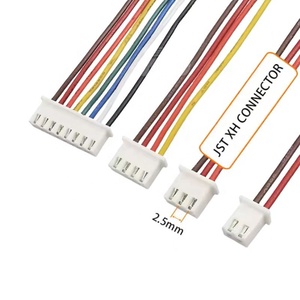Understanding SSD Drive Connectors
SSD (Solid State Drive) drive connectors play an essential role in the connectivity and functionality of SSDs in modern computing systems. These connectors allow for data transfer between the SSD and the motherboard, significantly influencing performance and reliability. As technology evolves, understanding the types, features, and applications of SSD drive connectors becomes crucial for both manufacturers and users alike.
Types of SSD Drive Connectors
There are several types of SSD drive connectors, each designed to cater to different technological standards and user requirements. The most common types include:
- SATA Connectors: These are standard connectors used for 2.5-inch SSDs. They provide a maximum data transfer rate of up to 6 Gb/s.
- PCIe Connectors: Used for more advanced SSDs, these connectors support NVMe (Non-Volatile Memory Express) technology, offering faster data transfer speeds of up to 32 Gb/s.
- M.2 Connectors: Compact and versatile, M.2 connectors support both SATA and PCIe SSDs, suitable for ultra-thin devices and enabling faster performance in smaller form factors.
- U.2 Connectors: Primarily used in enterprise-level applications, U.2 connectors allow for NVMe SSDs to connect via a standard hard drive interface, providing higher speeds and hot-swappable capabilities.
Functions and Features of SSD Drive Connectors
SSD drive connectors are not just about plugging in a storage device; they come with a range of functionalities and features that enhance performance:
- Data Transfer Rates: Depending on the type of connector, SSDs can achieve varying data transfer rates, with PCIe connectors leading the pack.
- Power Delivery: Most SSD connectors provide power to the drive, ensuring it operates seamlessly within a computer system.
- Compact Design: M.2 connectors offer space-saving advantages, essential for slim laptops and high-density computing environments.
- Durability: Many connectors are designed with long-term reliability in mind, featuring robust materials that can withstand frequent connections and disconnections.
- Compatibility: With various types of connectors available, users can find options that fit their specific hardware requirements, ensuring seamless integration.
Advantages of Using the Right SSD Drive Connectors
Choosing the appropriate SSD drive connector can yield several benefits, enhancing both performance and user experience:
- Enhanced Speed: By utilizing the fastest connector type, users can significantly speed up data access and transfer, improving overall system performance.
- Improved Efficiency: Efficient connectors minimize latency issues, providing smoother operation and quicker boot times.
- Increased Storage Options: The variety of connectors allows users to upgrade their storage solutions effortlessly, extending the lifespan and capabilities of their devices.
- Flexibility: Whether you are building a custom PC or upgrading an existing laptop, having the right connectors gives users the ability to tailor solutions to meet their specific needs.
- Future-Proofing: As SSD technology advances, connectors that support the latest standards ensure that your device remains at the forefront of performance innovation.













































